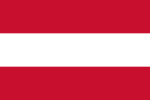Austria has a well-developed institutional and legal system, and most corruption cases under investigation by a parliamentary committee end with judicial trials and effective judgments. However, there are several significant Austrian corruption cases which have taken place during the past decade involving land and regional officials, high-level public officials, the central government and, in one instance, the former Chancellor.[1]
On Transparency International's 2022 Corruption Perceptions Index, Austria scored 71 on a scale from 0 ("highly corrupt") to 100 ("very clean"). When ranked by score, Austria ranked 20th among the 180 countries in the Index, where the country ranked first is perceived to have the most honest public sector.[2] For comparison with worldwide scores, the best score was 90 (ranked 1), the average score was 43, and the worst score was 11 (ranked 180).[3] For comparison with regional scores, the highest score among Western European and European Union countries [Note 1] was 90, the average score was 65 and the lowest score was 42.[4]
In most cases, corrupt practices were related to conflicts of interest, abuse of office, money laundering and influence peddling. The corruption scandals have put into doubt the ethical standards of the political elite.[1] This doubt is reflected in the findings of Eurobarometer 2012, where two-thirds of respondents perceive national politicians to be corrupt and also the most corrupt institution in Austria.[5]
- ^ a b "Austria Corruption Profile-Political Climate". Business Anti-Corruption Portal. Archived from the original on 12 June 2016. Retrieved 17 December 2013.
- ^ "The ABCs of the CPI: How the Corruption Perceptions Index is calculated". Transparency.org. 20 December 2021. Retrieved 8 April 2024.
- ^ "Corruption Perceptions Index 2023: Austria". Transparency.org. Retrieved 8 April 2024.
- ^ "CPI 2023 for Western Europe & EU: Rule of law and political integrity threats undermine action against corruption". Transparency.org. Retrieved 8 April 2024.
- ^ "Eurobarometer 2012- Austria" (PDF). The European Commission. Retrieved 17 December 2013.
Cite error: There are <ref group=Note> tags on this page, but the references will not show without a {{reflist|group=Note}} template (see the help page).
